FDI, Government Policy and International Business in New Zealand Essay
VerifiedAdded on 2019/11/26
|5
|1069
|214
Essay
AI Summary
This essay examines the role of exports and Foreign Direct Investment (FDI) in New Zealand's economic development. It highlights the country's reliance on specific commodities like horticulture, marine products, and dairy, and discusses the government's liberal FDI policies. The essay critically analyzes the impact of these policies, emphasizing the importance of capital inflows and the need to support value-adding industries beyond the traditional export sectors. It recommends changes in government policies, such as subsidies, reduced tariff rates, and tax incentives, to encourage investment in industries like transport services, machinery, manufacturing, and consulting. The conclusion stresses the significance of diversifying investments to achieve broader economic growth and development for New Zealand. The essay uses various sources to support its arguments and recommendations.
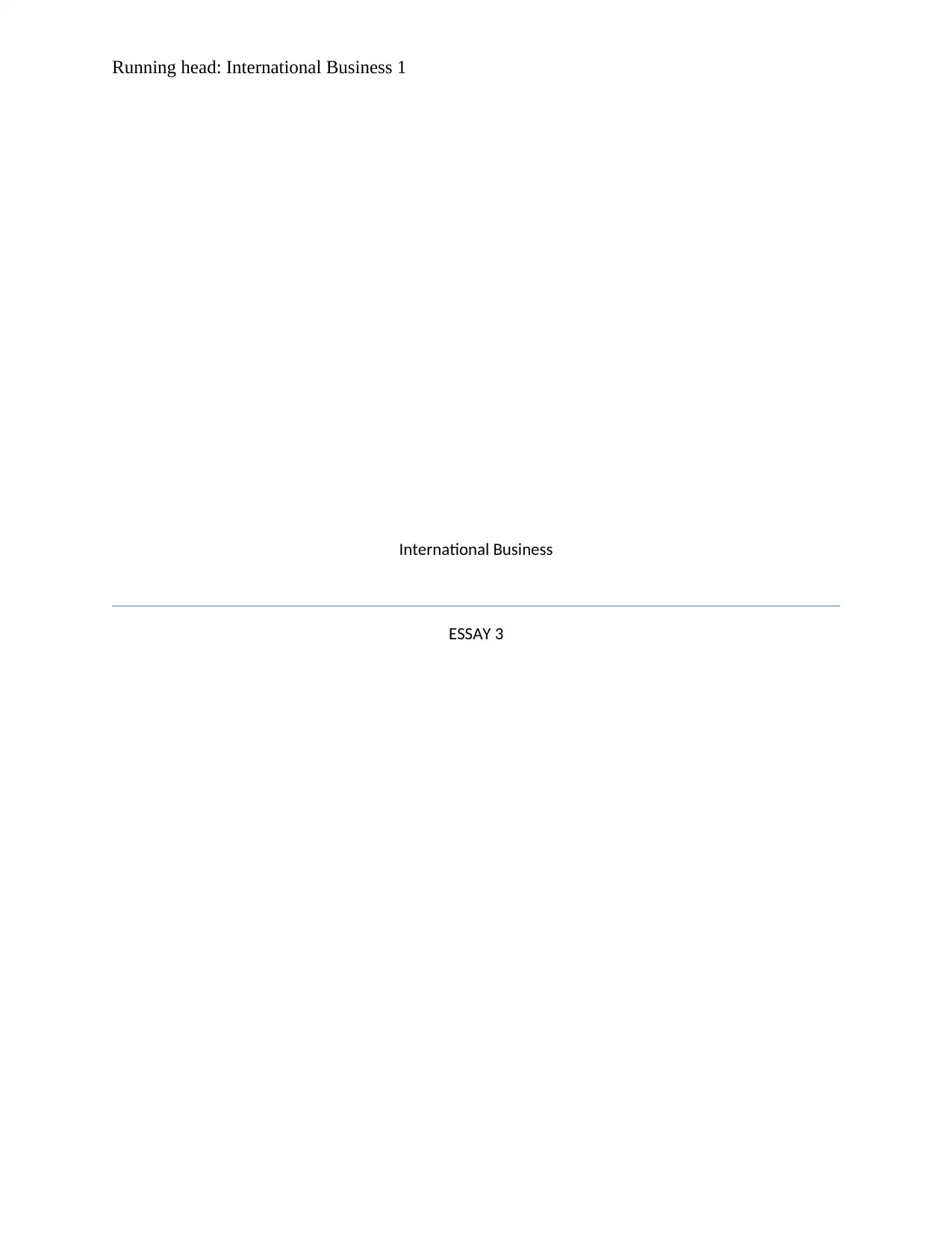
Running head: International Business 1
International Business
ESSAY 3
International Business
ESSAY 3
Paraphrase This Document
Need a fresh take? Get an instant paraphrase of this document with our AI Paraphraser
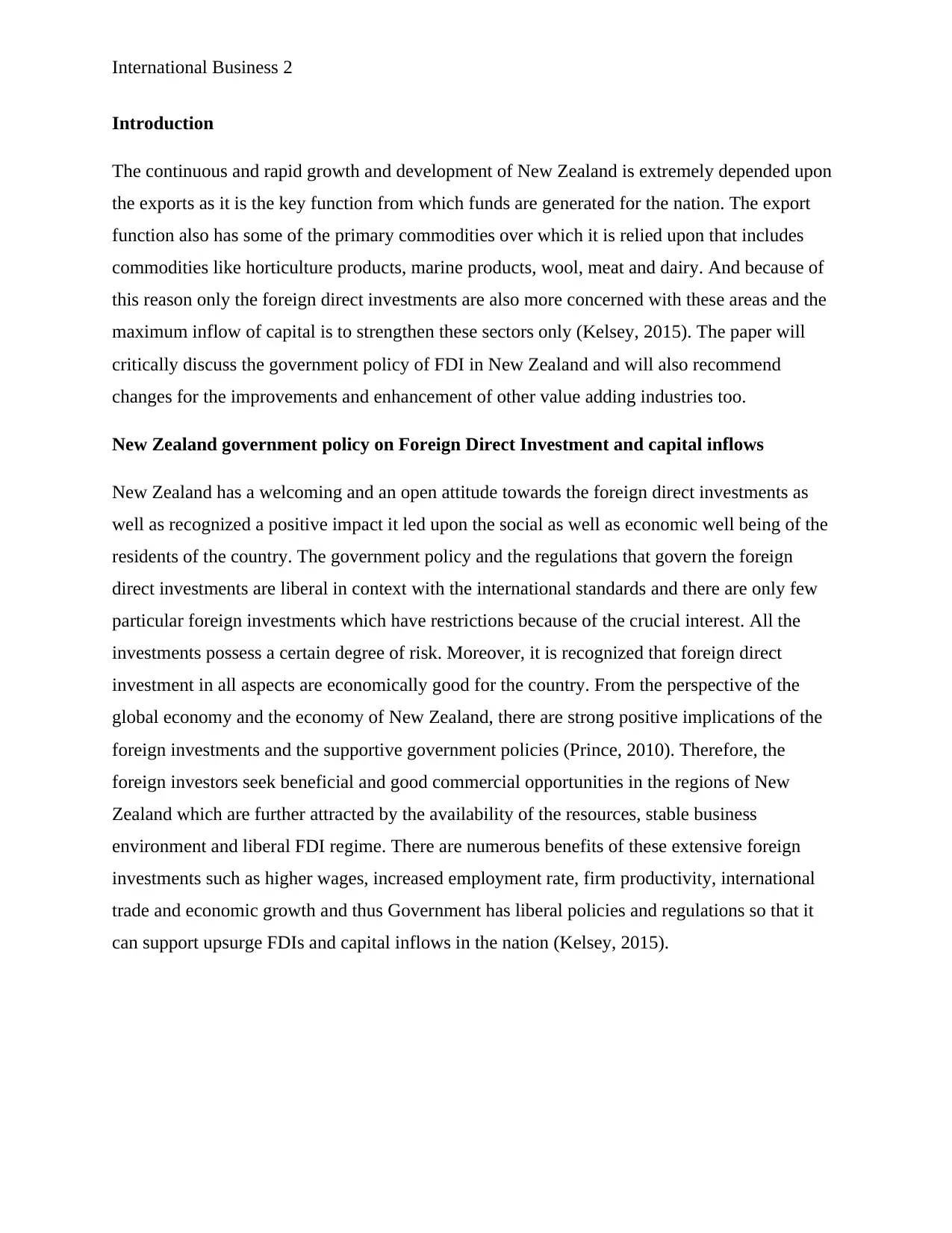
International Business 2
Introduction
The continuous and rapid growth and development of New Zealand is extremely depended upon
the exports as it is the key function from which funds are generated for the nation. The export
function also has some of the primary commodities over which it is relied upon that includes
commodities like horticulture products, marine products, wool, meat and dairy. And because of
this reason only the foreign direct investments are also more concerned with these areas and the
maximum inflow of capital is to strengthen these sectors only (Kelsey, 2015). The paper will
critically discuss the government policy of FDI in New Zealand and will also recommend
changes for the improvements and enhancement of other value adding industries too.
New Zealand government policy on Foreign Direct Investment and capital inflows
New Zealand has a welcoming and an open attitude towards the foreign direct investments as
well as recognized a positive impact it led upon the social as well as economic well being of the
residents of the country. The government policy and the regulations that govern the foreign
direct investments are liberal in context with the international standards and there are only few
particular foreign investments which have restrictions because of the crucial interest. All the
investments possess a certain degree of risk. Moreover, it is recognized that foreign direct
investment in all aspects are economically good for the country. From the perspective of the
global economy and the economy of New Zealand, there are strong positive implications of the
foreign investments and the supportive government policies (Prince, 2010). Therefore, the
foreign investors seek beneficial and good commercial opportunities in the regions of New
Zealand which are further attracted by the availability of the resources, stable business
environment and liberal FDI regime. There are numerous benefits of these extensive foreign
investments such as higher wages, increased employment rate, firm productivity, international
trade and economic growth and thus Government has liberal policies and regulations so that it
can support upsurge FDIs and capital inflows in the nation (Kelsey, 2015).
Introduction
The continuous and rapid growth and development of New Zealand is extremely depended upon
the exports as it is the key function from which funds are generated for the nation. The export
function also has some of the primary commodities over which it is relied upon that includes
commodities like horticulture products, marine products, wool, meat and dairy. And because of
this reason only the foreign direct investments are also more concerned with these areas and the
maximum inflow of capital is to strengthen these sectors only (Kelsey, 2015). The paper will
critically discuss the government policy of FDI in New Zealand and will also recommend
changes for the improvements and enhancement of other value adding industries too.
New Zealand government policy on Foreign Direct Investment and capital inflows
New Zealand has a welcoming and an open attitude towards the foreign direct investments as
well as recognized a positive impact it led upon the social as well as economic well being of the
residents of the country. The government policy and the regulations that govern the foreign
direct investments are liberal in context with the international standards and there are only few
particular foreign investments which have restrictions because of the crucial interest. All the
investments possess a certain degree of risk. Moreover, it is recognized that foreign direct
investment in all aspects are economically good for the country. From the perspective of the
global economy and the economy of New Zealand, there are strong positive implications of the
foreign investments and the supportive government policies (Prince, 2010). Therefore, the
foreign investors seek beneficial and good commercial opportunities in the regions of New
Zealand which are further attracted by the availability of the resources, stable business
environment and liberal FDI regime. There are numerous benefits of these extensive foreign
investments such as higher wages, increased employment rate, firm productivity, international
trade and economic growth and thus Government has liberal policies and regulations so that it
can support upsurge FDIs and capital inflows in the nation (Kelsey, 2015).
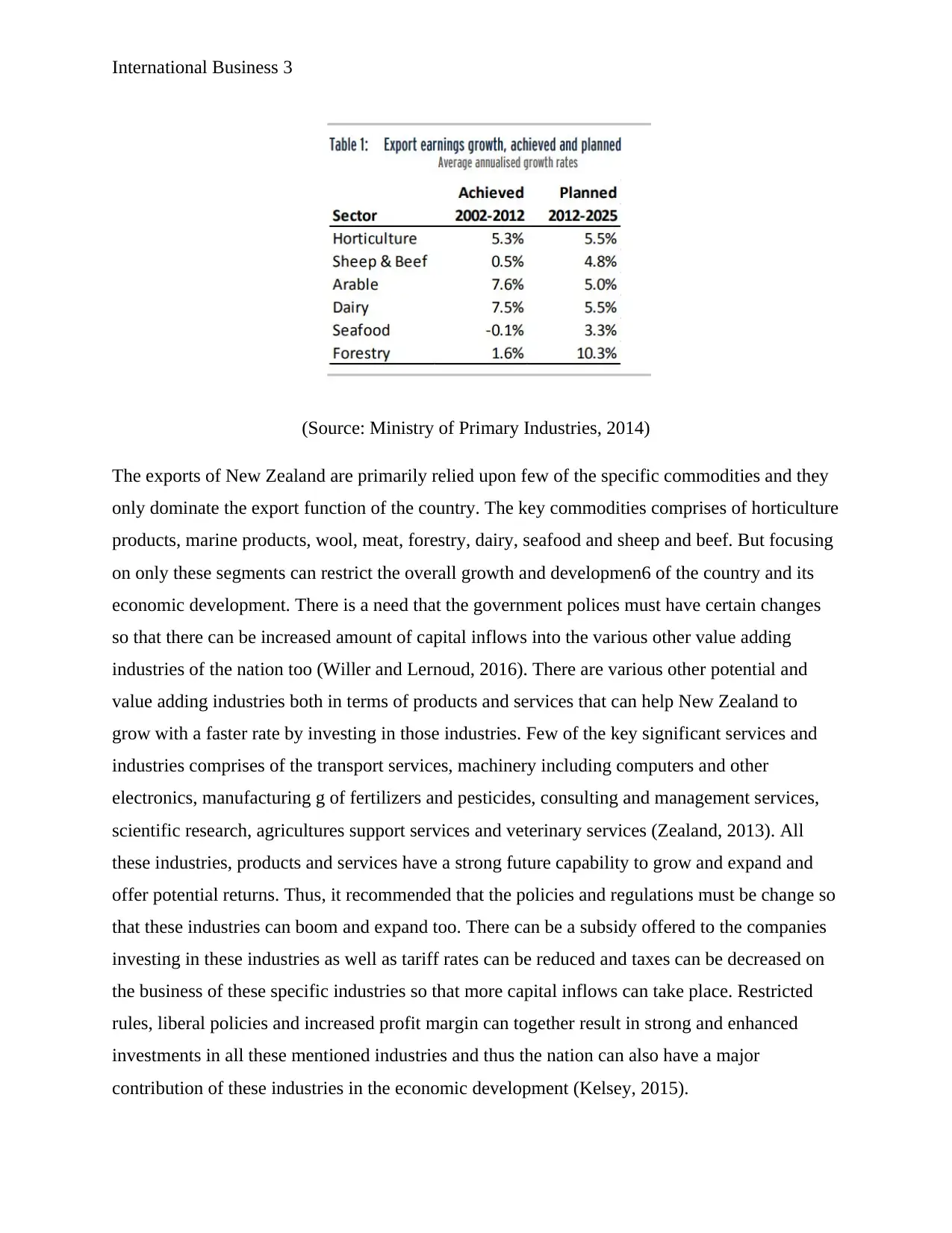
International Business 3
(Source: Ministry of Primary Industries, 2014)
The exports of New Zealand are primarily relied upon few of the specific commodities and they
only dominate the export function of the country. The key commodities comprises of horticulture
products, marine products, wool, meat, forestry, dairy, seafood and sheep and beef. But focusing
on only these segments can restrict the overall growth and developmen6 of the country and its
economic development. There is a need that the government polices must have certain changes
so that there can be increased amount of capital inflows into the various other value adding
industries of the nation too (Willer and Lernoud, 2016). There are various other potential and
value adding industries both in terms of products and services that can help New Zealand to
grow with a faster rate by investing in those industries. Few of the key significant services and
industries comprises of the transport services, machinery including computers and other
electronics, manufacturing g of fertilizers and pesticides, consulting and management services,
scientific research, agricultures support services and veterinary services (Zealand, 2013). All
these industries, products and services have a strong future capability to grow and expand and
offer potential returns. Thus, it recommended that the policies and regulations must be change so
that these industries can boom and expand too. There can be a subsidy offered to the companies
investing in these industries as well as tariff rates can be reduced and taxes can be decreased on
the business of these specific industries so that more capital inflows can take place. Restricted
rules, liberal policies and increased profit margin can together result in strong and enhanced
investments in all these mentioned industries and thus the nation can also have a major
contribution of these industries in the economic development (Kelsey, 2015).
(Source: Ministry of Primary Industries, 2014)
The exports of New Zealand are primarily relied upon few of the specific commodities and they
only dominate the export function of the country. The key commodities comprises of horticulture
products, marine products, wool, meat, forestry, dairy, seafood and sheep and beef. But focusing
on only these segments can restrict the overall growth and developmen6 of the country and its
economic development. There is a need that the government polices must have certain changes
so that there can be increased amount of capital inflows into the various other value adding
industries of the nation too (Willer and Lernoud, 2016). There are various other potential and
value adding industries both in terms of products and services that can help New Zealand to
grow with a faster rate by investing in those industries. Few of the key significant services and
industries comprises of the transport services, machinery including computers and other
electronics, manufacturing g of fertilizers and pesticides, consulting and management services,
scientific research, agricultures support services and veterinary services (Zealand, 2013). All
these industries, products and services have a strong future capability to grow and expand and
offer potential returns. Thus, it recommended that the policies and regulations must be change so
that these industries can boom and expand too. There can be a subsidy offered to the companies
investing in these industries as well as tariff rates can be reduced and taxes can be decreased on
the business of these specific industries so that more capital inflows can take place. Restricted
rules, liberal policies and increased profit margin can together result in strong and enhanced
investments in all these mentioned industries and thus the nation can also have a major
contribution of these industries in the economic development (Kelsey, 2015).
⊘ This is a preview!⊘
Do you want full access?
Subscribe today to unlock all pages.

Trusted by 1+ million students worldwide
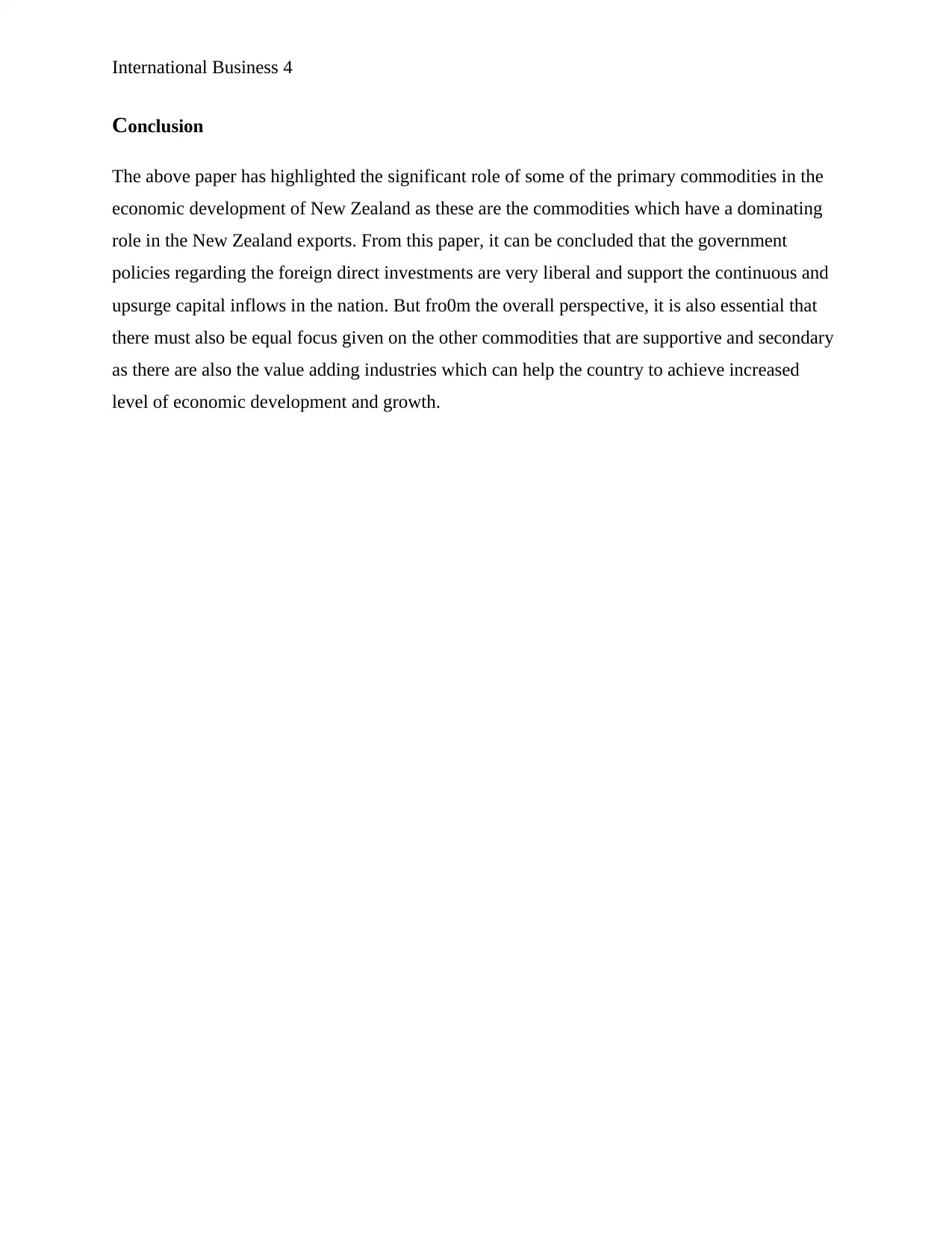
International Business 4
Conclusion
The above paper has highlighted the significant role of some of the primary commodities in the
economic development of New Zealand as these are the commodities which have a dominating
role in the New Zealand exports. From this paper, it can be concluded that the government
policies regarding the foreign direct investments are very liberal and support the continuous and
upsurge capital inflows in the nation. But fro0m the overall perspective, it is also essential that
there must also be equal focus given on the other commodities that are supportive and secondary
as there are also the value adding industries which can help the country to achieve increased
level of economic development and growth.
Conclusion
The above paper has highlighted the significant role of some of the primary commodities in the
economic development of New Zealand as these are the commodities which have a dominating
role in the New Zealand exports. From this paper, it can be concluded that the government
policies regarding the foreign direct investments are very liberal and support the continuous and
upsurge capital inflows in the nation. But fro0m the overall perspective, it is also essential that
there must also be equal focus given on the other commodities that are supportive and secondary
as there are also the value adding industries which can help the country to achieve increased
level of economic development and growth.
Paraphrase This Document
Need a fresh take? Get an instant paraphrase of this document with our AI Paraphraser
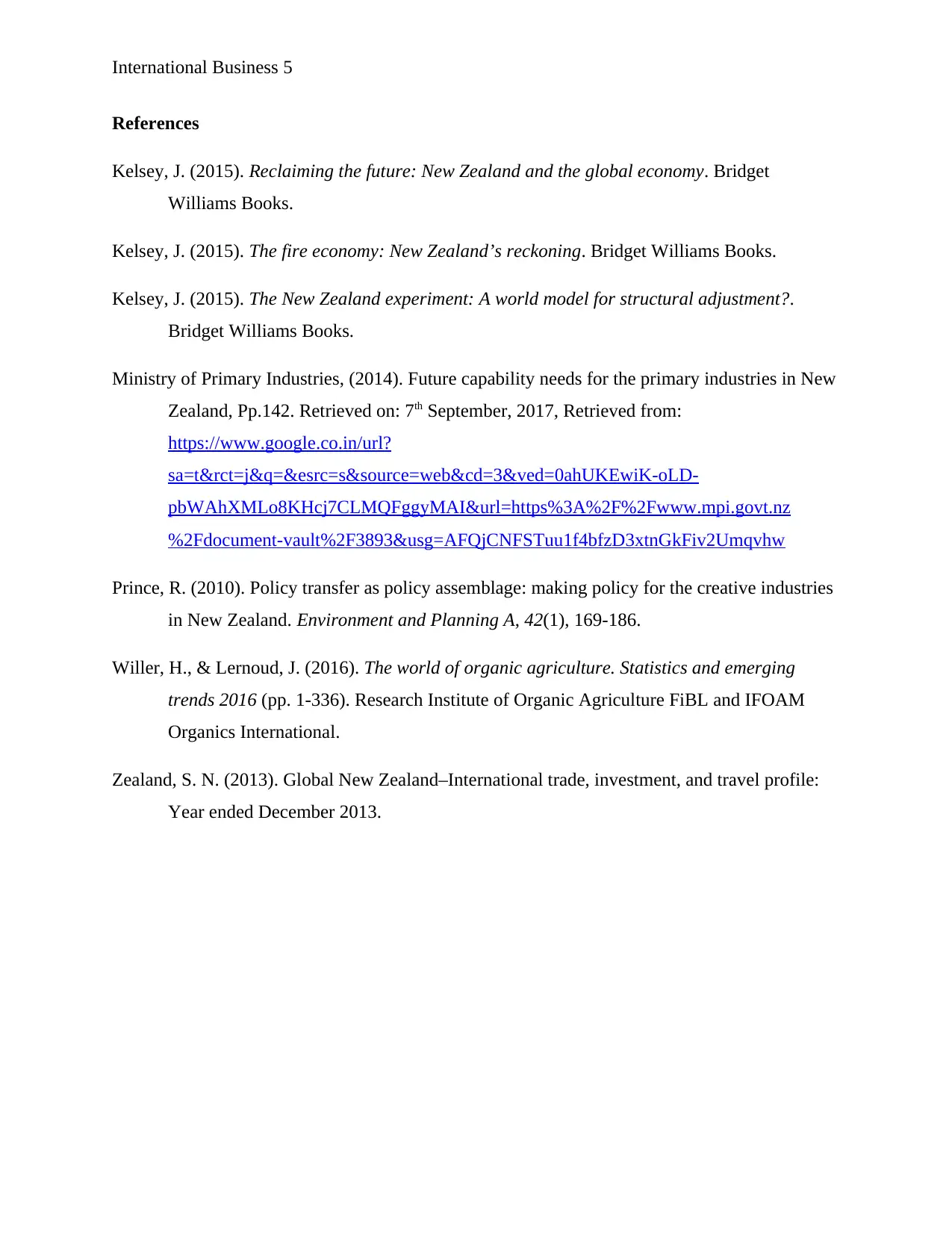
International Business 5
References
Kelsey, J. (2015). Reclaiming the future: New Zealand and the global economy. Bridget
Williams Books.
Kelsey, J. (2015). The fire economy: New Zealand’s reckoning. Bridget Williams Books.
Kelsey, J. (2015). The New Zealand experiment: A world model for structural adjustment?.
Bridget Williams Books.
Ministry of Primary Industries, (2014). Future capability needs for the primary industries in New
Zealand, Pp.142. Retrieved on: 7th September, 2017, Retrieved from:
https://www.google.co.in/url?
sa=t&rct=j&q=&esrc=s&source=web&cd=3&ved=0ahUKEwiK-oLD-
pbWAhXMLo8KHcj7CLMQFggyMAI&url=https%3A%2F%2Fwww.mpi.govt.nz
%2Fdocument-vault%2F3893&usg=AFQjCNFSTuu1f4bfzD3xtnGkFiv2Umqvhw
Prince, R. (2010). Policy transfer as policy assemblage: making policy for the creative industries
in New Zealand. Environment and Planning A, 42(1), 169-186.
Willer, H., & Lernoud, J. (2016). The world of organic agriculture. Statistics and emerging
trends 2016 (pp. 1-336). Research Institute of Organic Agriculture FiBL and IFOAM
Organics International.
Zealand, S. N. (2013). Global New Zealand–International trade, investment, and travel profile:
Year ended December 2013.
References
Kelsey, J. (2015). Reclaiming the future: New Zealand and the global economy. Bridget
Williams Books.
Kelsey, J. (2015). The fire economy: New Zealand’s reckoning. Bridget Williams Books.
Kelsey, J. (2015). The New Zealand experiment: A world model for structural adjustment?.
Bridget Williams Books.
Ministry of Primary Industries, (2014). Future capability needs for the primary industries in New
Zealand, Pp.142. Retrieved on: 7th September, 2017, Retrieved from:
https://www.google.co.in/url?
sa=t&rct=j&q=&esrc=s&source=web&cd=3&ved=0ahUKEwiK-oLD-
pbWAhXMLo8KHcj7CLMQFggyMAI&url=https%3A%2F%2Fwww.mpi.govt.nz
%2Fdocument-vault%2F3893&usg=AFQjCNFSTuu1f4bfzD3xtnGkFiv2Umqvhw
Prince, R. (2010). Policy transfer as policy assemblage: making policy for the creative industries
in New Zealand. Environment and Planning A, 42(1), 169-186.
Willer, H., & Lernoud, J. (2016). The world of organic agriculture. Statistics and emerging
trends 2016 (pp. 1-336). Research Institute of Organic Agriculture FiBL and IFOAM
Organics International.
Zealand, S. N. (2013). Global New Zealand–International trade, investment, and travel profile:
Year ended December 2013.
1 out of 5
Related Documents
Your All-in-One AI-Powered Toolkit for Academic Success.
+13062052269
info@desklib.com
Available 24*7 on WhatsApp / Email
![[object Object]](/_next/static/media/star-bottom.7253800d.svg)
Unlock your academic potential
Copyright © 2020–2026 A2Z Services. All Rights Reserved. Developed and managed by ZUCOL.





